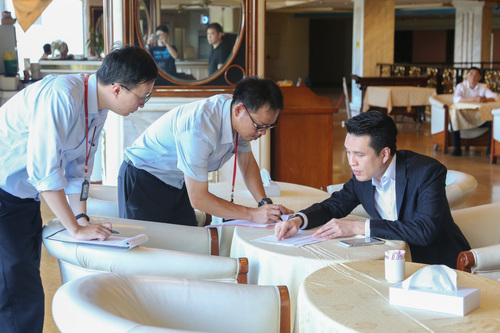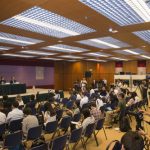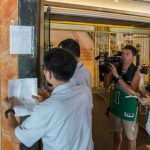 MGTO inspectors explain the content of the notification mandate to the hotel representative
MGTO inspectors explain the content of the notification mandate to the hotel representative
Beijing Imperial Palace Hotel (formerly known as New Century Hotel), located at Taipa, Macao, has committed serious administrative irregularities, constituting threats to public safety and harming the image of Macao’s tourism sector, leading to the decision of the Macao Government Tourism Office (MGTO) to implement provisional measures to close down the hotel establishment tomorrow (23 July). MGTO and other relevant departments jointly held a press conference today (22 July), announcing that Beijing Imperial Palace Hotel has committed serious administrative irregularities and has failed to carry out essential fire safety measures, thus constituting risks and possible harm to public safety. In view of safety reasons and public interest, MGTO decided to implement provisional measures to close down Beijing Imperial Palace Hotel tomorrow (23 July) for a period of six months, in accord with the provisions of the Administrative Procedure Code. The public is prohibited from entering the establishment without authorization during the period of temporary closure. Unauthorized entry will constitute a violation of order. MGTO Director Maria Helena de Senna Fernandes, together with Acting Deputy Director of Labour Affairs Bureau, Ng Wai Han, Acting Head of Research and Planning Department of Fire Services Bureau, Lam Io Fan, and Acting President of Executive Committee of Consumer Council, Chan Hon Sang, met with the media. Civic and Municipal Affairs Bureau, Public Security Police Force, Government Information Bureau, Environmental Protection Bureau and Tourism Crisis Management Office also had their representatives present at the press conference. Involvement in serious administrative irregularities and illegal reconstructions The restaurants/catering outlets and numerous other facilities of Beijing Imperial Palace Hotel either had their licenses suspended or were permanently closed down earlier, including New Century Sauna, Waterfall Garden Tea House, New Century Chinese Restaurant, Scenic Veranda Coffee Shop, Beijing Imperial Palace Club House and Caesar Terrace, one of which even no longer exists. During past inspections, MGTO kept discovering new evidence that the hotel has committed severe irregularities and a multitude of illegal reconstructions. Serious fire safety issues include inadequate number of fire extinguishers, defective emergency lighting systems, blocked exits, obstructed escape routes, malfunctioning smoke chamber, use of decorative materials without fireproofing and storage of fuel beyond legal limits, etc. MGTO has imposed various sanctions procedures and penalties against the above irregularities, and demanded the hotel to rectify these within a stipulated time limit. However, most of the situations remained unsettled. Failure to meet the requirements for operation During its latest inspection in June, MGTO uncovered that the overall facilities of Beijing Imperial Palace Hotel still failed to meet the requirements stipulated by the regulations and fire safety standards. In view of public safety, MGTO called various public entities including Civic and Municipal Affairs Bureau, Labour Affairs Bureau, Health Bureau, Public Security Police Force, Fire Services Bureau, Land, Public Works and Transport Bureau and Environmental Protection Bureau to form an inspection committee to carry out a joint inspection at Beijing Imperial Palace Hotel on 12 July. The inspection committee concluded that the hotel failed to meet the essential requirements to maintain its operation, and submitted a report on the irregularities identified during the inspection. Provisional close-down measures Considering the severity of the hotel’s irregularities against fire safety and the inspection committee’s conclusion, the Office has reason to believe that it would cause serious or irreparable damage to the public if the Office did not adopt any provisional measures. Therefore, according to the provisions of Clause No. 1, Article No. 83 of the Administrative Procedure Code, MGTO decided to implement provisional measures to close down Beijing Imperial Palace Hotel for a period of six months. MGTO conducted an interdepartmental meeting on 20 July with the representatives of partner entities in the joint inspection and other departments concerned, to discuss measures for the closing down of the establishment. Following that, the Office also met with representatives of travel agencies and hotels to announce its measures to shut down the establishment. In addition, MGTO publicized its notification mandate about its administrative decision to close down Beijing Imperial Palace Hotel temporarily in designated Chinese and Portuguese newspapers on 22 July. The notification mandate was posted at Beijing Imperial Palace Hotel this morning (22 July); teaming up with the police force, MGTO inspectors will close down the establishment tomorrow (23 July) and post the notification mandate at all entrances and exits of the hotel. Besides, MGTO has informed travel agencies to make arrangements accordingly and set up a help desk at the Tourism Activities Centre, where staff members from MGTO, Labour Affairs Bureau, Consumer Council and Tourism Crisis Management Office are stationed to provide information. Enquiries can also be made through Tel: 28333000. Beijing Imperial Palace Hotel (formerly known as New Century Hotel) is a five-star hotel opened in 1992 in Macao. The hotel applied for approval to be renamed as Beijing Imperial Palace Hotel in 2013 and currently operates over 500 rooms. This is the first time in Macao to have a five-star hotel closed down temporarily by the Government. This press release is available at: http://industry.macaotourism.gov.mo/en/pressroom/index.php
View gallery




